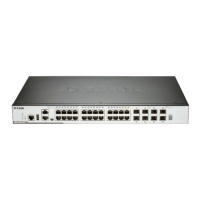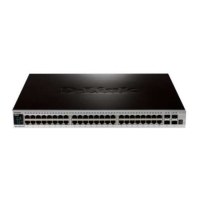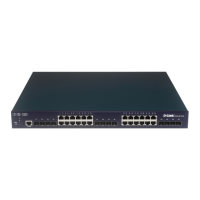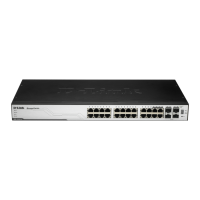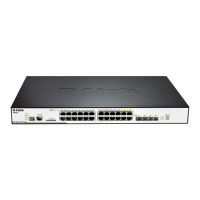DGS-3630 Series Layer 3 Stackable Managed Switch Web UI Reference Guide
367
Parameter Description
Capability Graceful Restart
Select to enable or disable the graceful restart capability here. This is used to
enable the feature to advertise the graceful restart capability to its neighbors.
Description
Enter the description for the BGP neighbor here. This string can be up to 80
characters long. Select the Clear option to remove the description.
EBGP Multihop
Enter the eBGP multi-hop TTL value here. This is used to allow the router to
establish a BGP session with an eBGP peer that is not directly connected to the
local peer. The range is from 1 to 255. Select the Default option to use the default
value.
Password
Enter the password here that will be used between two BGP peers. This can be
up to 25 characters long. Select the Clear option to remove the password.
TCP Reconnect
Enter the TCP reconnect port number here. This is used configure the minimum
interval that BGP uses to send TCP connect requests to the peer after a TCP
connection failed. The range is from 1 to 65535 seconds. Select the Default
option to use the default value, which is 120 seconds.
Update Source
Select the update source here. This is used to allow a BGP session to use any
operational interface's IP address as the source address to initiate the TCP
connection. Select the Default option to use the default settings.
• VID - Enter the VLAN ID that will be used here. The range is from 1 to 4094.
• Loopback - Enter the ID of the loopback interface that will be used here. The
range is from 1 to 8.
Weight
Enter the BGP weight value here. This is used to specify the weight assigned to
the routes that are received from a specific neighbor. The range is from 0 to
65535. Select the Default option to use the default value.
Allow AS In
Select to enable or disable the allow AS in feature here. This is used to enable
routers to allow its own AS number to appear in received BGP update packets.
Allow AS In Value
Enter the allow AS in value here. This specifies the maximum number of local
AS’s to allow the appearance in the AS-path attribute of the update packets. The
range is from 1 to 10.
Default Originate
Select to enable or disable the default originate feature here. This is used to
enable the feature to generate the default route to a neighbor.
Route Map Name
Enter the name of the route map that will be used here. This name can be up to
16 characters long.
Click the Apply button to accept the changes made.
After clicking the Please Select button, the following page will appear.
Figure 6-212 Neighbor General Settings (Please Select) Window
Select the VRF entry and click the OK button to use the selected VRF entry.
Enter a page number and click the Go button to navigate to a specific page when multiple pages exist.

